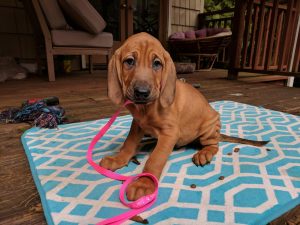Puppy Socialization!
May 8, 2017
 Puppies steal their way into our hearts with their adorable antics and sweet personalities. However, contrary to what we might believe, they are not born being automatically outgoing, curious, and happy. As they grow, puppies go through both physical and mental/social development stages. Besides the physical changes that puppies experience as they grow into adulthood, they also experience social development changes.
Puppies steal their way into our hearts with their adorable antics and sweet personalities. However, contrary to what we might believe, they are not born being automatically outgoing, curious, and happy. As they grow, puppies go through both physical and mental/social development stages. Besides the physical changes that puppies experience as they grow into adulthood, they also experience social development changes.
From the time a puppy is 3 weeks old until he is approximately 14 weeks old, he is in a critical socialization period when the brain is different than that of an adult dog; he is more curious about the world around him and sociability outweighs fear. It is the prime time in a puppy’s life to have lots of fun new experiences, to meet nice new people, and to expose him to the world around him. A puppy who has incomplete or inappropriate socialization at this stage can develop behavioral problems later in life. If you take on the responsibility of raising a puppy, you will want to make sure that in addition to meeting all of his physical needs, you also address social development.
When socializing your puppy, it’s important that he gets to interact with a variety of new environments, objects, and individuals. Dog training organizations, such as the Pet Professional Guild, have wonderful puppy socialization checklists online to help guide you through socialization. A general list of things to expose your puppy to includes: People of different genders, ages, and physical characteristics (bald, beards, etc); different types of clothing (hats, sun glasses, coats, skirts); other animals (only if they are friendly and will not hurt the puppy); different locations and weather; different items (brooms, bicycles, vacuums, skateboards, etc); different sounds; different textures (tile, carpet, grass, wood, etc). Start off with socializing your puppy in the home and then slowly expand your puppy’s experiences in safe, clean environments and with dogs who you know are fully vaccinated and healthy. While it is important to socialize your puppy, a puppy is not fully vaccinated during his critical socialization period and you do not want to risk exposing him to a dangerous disease.
The key to proper puppy socialization however, is to not just exposure to new things but having fun and enjoying each new experience. Exposing a puppy to something that they find scary and just having them “deal with it” so they “get over it” can actually have the opposite reaction and increase a dog’s fear. Puppies also go through a couple of fear periods in their social development. The first occurs anywhere between 8 and 11 weeks of age and lasts for about a week. The second fear period can occur anywhere between 4 and 14 months and can last up to 3 weeks. A key indicator that a puppy has entered a fear period is a behavior change – he is suddenly more fearful of things that he was okay with just days before. If a puppy in his fear period is put into a situation where he is afraid and has a scary encounter, it is possible for him to develop a lifelong fear of the thing that scared him. While he might exhibit his fear by cowering away from the item, avoiding it, or shutting down and ignoring its presence, he might also tell you that he’s scared by growling, barking, lunging, or even biting at the “scary thing.” During your puppy’s fear periods it is especially critical that socialization is a positive, stress-fear experience. If he acts fearful, add distance between him and the fearful trigger until fear behavior subsides and provide treats, don’t force interactions, even if he was ok with those same interactions before. If your puppy suddenly won’t take treats that he normally likes, that means that the situation is too much for him and you should remove him from the situation entirely. For more information on how (and how not) to socialize puppies, check out Laura VanArendonk Baugh’s, CPDT, KPACTP, article “Don’t Socialize the Dog!”.
It is important to keep in mind that a dog’s behavior is not simply due to how you raise them. Behavior is not a question of nature versus nurture- both factor into a dog’s behavior. A puppy could be incredibly well socialized and then as he ages, he still might develop fearful or anxious behavior. Or, you could have a puppy that was poorly socialized when young, but with time, patience, and proper training techniques he grows into a confident and relaxed adult dog. A puppy’s genetics can even influence future behavior. Even puppies that are born in safe environment to healthy moms can develop behavior problems. Each dog is an individual and there are many factors that play into behavior.
You can help set yourself and your puppy up for success by making sure you are socializing him to the world in a fun, safe manner. Make sure that when you start training your puppy, you use positive reinforcement, relationship-based training methods! Certain traditional dog training methods that use force, fear, or pain to train can exacerbate existing behavior problems and can create new ones. Just as with socializing, you want to make sure that when you train your puppy, that he has fun working with you and learning from you. That will help strengthen your relationship and help him grow into a confident, happy adult dog.



